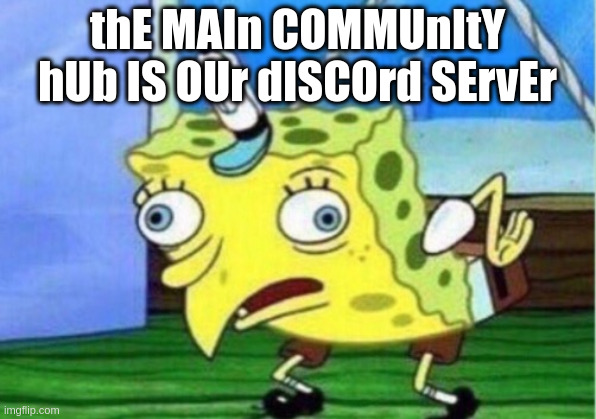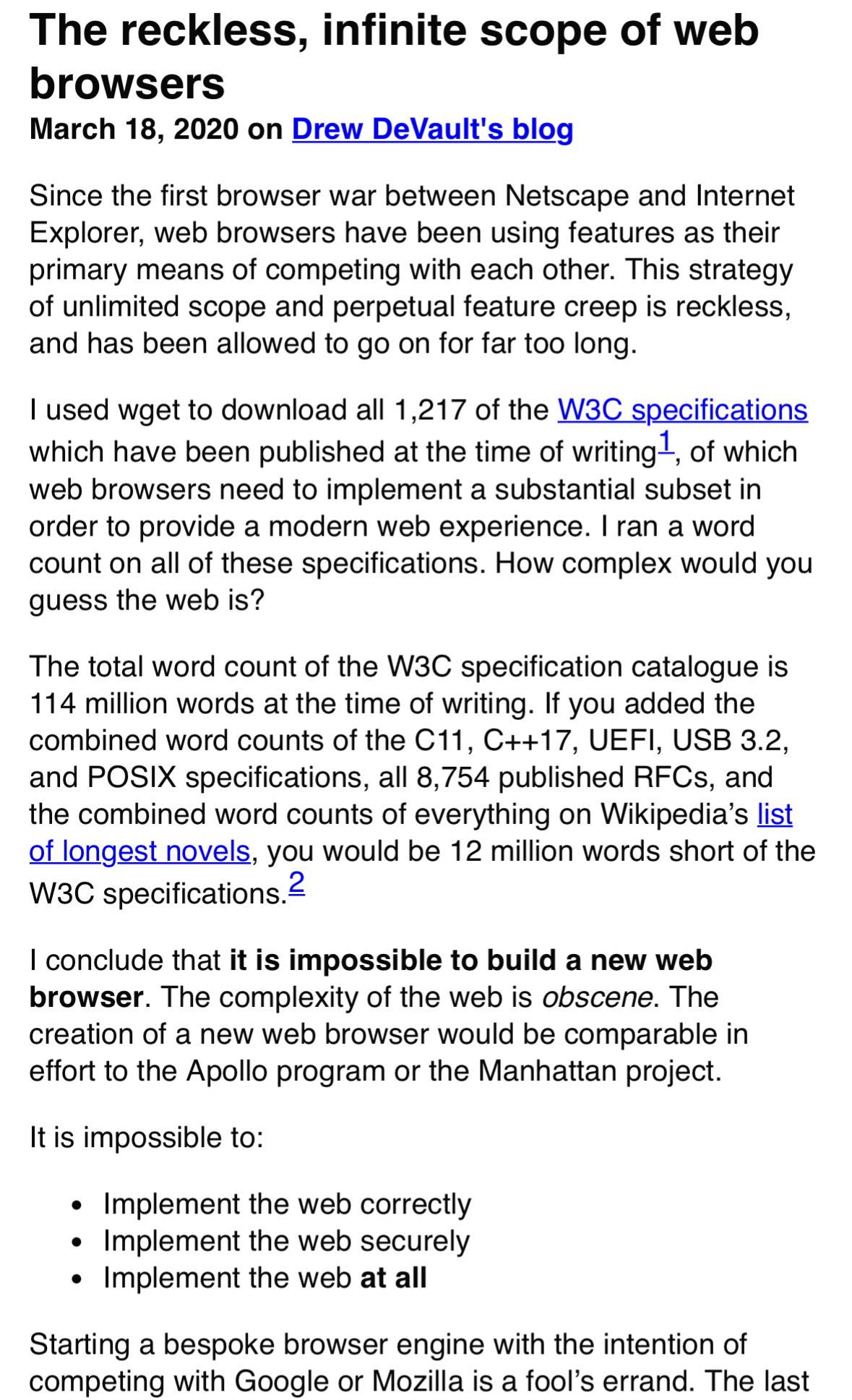I want to follow updates from this project. They have a Twitter account but not Mastodon sigh

RSS is not even enabled on the Newz page on the website.
I share the disappointment.
I found they have a newsletter, that sounds like an acceptable middle ground, not good, not terrible.
Love the idea! Shopify as the highest tier sponsor? Not so much.
I’m curious what issue you see with that? It seems like the project is only accepting unrestricted donations, but is there something suspicious about shopify that makes it’s involvement concerning (I don’t know much about them)?
My best guess would be that Shopify either care about the open Web or had some disagreements with Google.
I can’t find anything shady on them, but maybe I’m looking the wrong places.
My guess is they just want a high value backlink for their SEO performance 😉
Why? Shopify has been sponsoring stuff like community gaming events for a few years now.
It’ll be interesting to see how this plays out. I’ve had more than a handful of people bitching at me that it’s impossible to make a new, open web browser in this day.
Interestingly the founder of the project seems to explicitly disagree with that article
Their rendering engine is already pretty solide (see penultimate video in their channel). Now that their “no third party code” restriction is lifted, they can actually focus on building a browser engine instead of recreating 30 years worth of technologies from scratch.
Funny how in the video the guy say that all other browsers are based on Google’s code. But Firefox is also independent right?
He says “powered by or funded by Google”. Firefox depends on Google financially, most of the income of Mozilla comes from Google paying for being the default search engine.
They try to diversify their income (Firefox VPN, email alias service, etc.), but anything they try gets a huge backlash from the community, and still small compared to the the money from google.
Is this their way of asking Google for money?
I think google need firefox exist to avoid anti trust, and Mozilla need google to keep the the six figures payroll for the CEO. So yes.
C++
If they’re starting a browser from scratch, why would they not have chosen Rust? Seems very short sighted to not have learned from Firefox.
Must be planning on actually shipping something
/s
Ship what, segfaults / invalid memory access? Lol
CVEs lol
It would be nice if people read the post and the project before randomly making assumptions such as implying the project started from scratch yesterday or its run by some amateurs, this is a 4 year old project! It’s founded by a former KHTML/Webkit developer for Apple!
If only.
Servo already exists and is independent and written in a modern language and way ahead of this.
I mean, competition is good but they aren’t the only independent browser engine.
Remind me in 2 years when this project becomes discontinued…
is it open source?
Good luck!
builds a new browser from scratch without borrowing existing code
still chooses to do it in C++
Epic fail
Not sure if you are trying to be funny, but if not: enlighten us?
Sure :)
There are a lot of downsides of C++ compared to more modern languages that make it not a great choice if you’re starting a web browser from scratch
- Complexity of the language leading to increased bugs and slower development
- Manual memory management is error-prone and leads to issues like memory leaks or segmentation faults. Modern browsers need to handle large amounts of dynamic content, making memory management complicated
- C++ lacks some of the built-in safety features of more modern languages, which has led to the majority of security vulnerabilities found in major browsers. It’s so bad that Mozilla invented an entirely new programming language just to deal with this
- Compared to higher-level languages, C++ can be slower to develop in, which may impact the ability to quickly implement new web standards or features unless you have a massive team
- While C++ is cross-platform, ensuring consistent behavior across different operating systems can be more challenging than with some other languages.
- Newer languages often provide built-in support for concurrent programming, garbage collection, and other features useful for browser development, which C++ lacks.
So tl;dr: a browser but in C++ will take much longer to develop, have fewer features, more bugs, less concurrency and and more security vulnerabilities
Thanks for laying out your concerns. As a C++ developer who does not know the other languages you speak of (I assume Rust, Go), I can agree to some of your points, but also some of them I see differently:
-
C++ can be complex, because it has a lot of features and especially the newer standards have brought some syntax that is hard to understand or read at times. However, those elements are not frequently used, or if they are, the developer will get used to them quickly & they won’t make development slow. As a matter of fact, most development time should be spent on thinking about algorithms, and thinking very well before implementing them - and until implementation, the language does not matter. I do not think that language complexity leads to increased bugs per se. My biggest project is just short of 40k lines of code, and most of the bugs I produced were the classical “off by one” or missing range checks, bugs that you can just as well produce in other languages.
-
C++ no longer requires you to do manual memory management - that is what smart pointers are for, and RAII-programming.
-
I can’t make a qualified comment on that, due to lack of expertise - you might be right.
-
You’re somewhat repeating point 1) here with slow development. But you raise a good point: web standards have become insane in terms of quantity and interface sizes. Everyone and their dog wants to reinvent the wheel. That in itself requires a very large team to support I would say. As stated for point 1), I do not agree development in C++ has to be slower
-
True, as someone who just suffered from problems introduced on windows (cygwin POSIX message queues implementation got broken by Win10, and inotify does not work on Windows Subsystem for Linux) I can confirm that while the C++ standard library is not much of a problem, the moment you interface with the host OS, you leave the standard realm and it becomes “zombieland”. Also, for some reason, the realtime library implementation on MacOS is different, breaking some very simple time-based functions. So yeah, that’s annoying to circumvent, but can be done by creating platform specific wrapper libraries that create a uniform API. For other languages, it appears this is done by the compilers, which is probably better - meaning the I/O operations got taken into those language’s core features
-
I am highly doubtful of people relying on garbage collection - a programmer that doesn’t know exactly when his objects come into existence, and when they cease to exist is likely to make much bigger mistakes and produce very inefficient code. The aforementioned smart pointers in C++ solve this issue: object lifetime is the scope of the smart pointer declaration, and for shared pointers, object lifetime expires when the last process using it leaves the scope in which it is declared. For concurrent programming, I do not know if you mean concurrency (threads) or multiple people working on the same project. While multi-threading can be a bit “weird” at first, you have a lot of control over shared variables and memory barriers in C++ that might enable a team to produce a browser that is much faster, which I believe is a core requirement towards modern browsers
As for your tl;dr: definitely not “less concurrency”, that makes no sense. The other points may or may not be true, keeping in mind the answers I gave above.
Appreciate you taking the time to reply in such detail! Some good insights thank you
You had some valid points as well - I enjoy a good constructive exchange, thank you! :)
-
C++ is a very old, extremely complex language. There are arguably objectively better modern alternatives, such as Rust.
The language choice was because Ladybird started as a component of SerenityOS, which is also written in C++. With this separation, they are free to gradually introduce other language(s) into the codebase, and maybe eventually replace C++ entirely, piece by piece.
In Hackernews thread about this, the head maintainer mentioned that they have been evaluating several languages already, so we’ll see what the future brings.
In the meantime, let’s try to be mature about it, what do you say?
The dev has 30 years of experience with c++ and a lot of it was on browsers.
He tried to incorporate rust with the help of “JT”, one of the original rust designers/devs and according to Andreas it didn’t work that well due to the web being too objet oriented or something like that. They both worked together (well, mostly “JT”) to create a new safe programming language called “yakt” that transpile to c++, but the project is currently pretty much dead because nobody is really working on it anymore.
The web being too object oriented for rust? Assuming that made sense, who wrote the dang language? If that’s true I’m even less confident they know what they’re doing then I was before.
You’re doubting someone’s ability to create a web browser knowing that they specialize in browser development since the early 2000s?
If this isn’t enough to have confidence in them then nothing will.
Using my decades of experience in how programming and compilers works and the fact Mozilla has used it to great effect and how it is being used for parts of the Linux kernel… Yeah just a general statement it doesn’t make any sense.
Maybe they aren’t effective at designing software with the paradigms of the language or they don’t like it but the given explanation doesn’t track.
I am pretty sure it was about how it was difficult for them to do oop with rust, but I reckon it was long ago and my programming knowledge is minimal.
Found it:
https://rl.rootdo.com/r/rust/comments/yuxb8a/serenityos_author_rust_is_a_neat_language_but
I vaguely remember the talk about needing oop for the web being on discord and not twitter, so the twitter post is likely a reaction that.
Reading all of that it sounds mostly like a dev who has spent 20 years doing things the C++ way wasn’t comfortable learning something new. Like basically they’ve been using horrible design patterns that Rust bans because they’re horrible, and instead of learning better approaches they just say Rust is bad
It could be. But then again, he did have the help of a Rust designer/core dev. I believe they even wrote the first iteration of the “Jakt” compiler in Rust before rewriting it in Jakt itself, so Andreas isn’t against using Rust.
Rust or bust
Then build a browser in rust…
It’s hard to understand the purpose of this. The difficulty of the project (i.e. complexity of the web) is the real problem that needs solving. We don’t need another fork of the browser-verse. We need a fork of the web itself.
They have a fork of the web. Its called the dark web. They use it to sell hookers and drugs.
We also have a fork of money, it’s called crypto and it’s used to sell and buy hookers and drugs. Every fork of something end up used to buy hookers and drugs. Truly marvelous!
I mean…yes?
Considering how much Google has entrenched itself into the Internet (see manifest v3 fiasco), I would argue that creating a new browser is a fork of the web
I use Firefox.
Ok
I hope this pans out, because I’ve long ago lost hope on Firefox being a worthy alternative to Chromium.
Have you used Firefox recently? There are a few chrome only sites but I’ve been daily driving it for a few months and it’s mostly upside
I can no longer play any podcast hosted on Apple podcasts, which is a distressing amount of them.
They work just fine in Chromium.
Huh, I just went to the website to try and it worked for me
No clue, I guess I’m just not lucky. It doesn’t work on either my phone or my desktop
You can use the app cider for that (Oh, it is a Electron app 😂🙈)
Fair enough, I capitulated and I use spotify for podcasts now
The only reason I dont use spoitfy, which one particular show was available on both, is because it doesnt support my RSS feed.
As Firefox will introduce Manifest V3 which will make ad-blockers unusable, I hope they will not implement that as well … But since this is so new, this will not have any add-ons at all for the foreseeable future
deleted by creator
Lets hope they stay true to their words and do not deprecate
Manifest V2later, since firefox is an open source project, theoretically anyone could fork it and build this on their own, but I heard compile-times for firefox is long. And as complexity of the web increases maintaining your own forked web browser will become harder and harder. That is why projects like Ladybird are important imo.As more and more webpages do not support firefox anymore (Notion did not work for me today) the web will become unusable in a dystopian Manifest-V3 only future.













